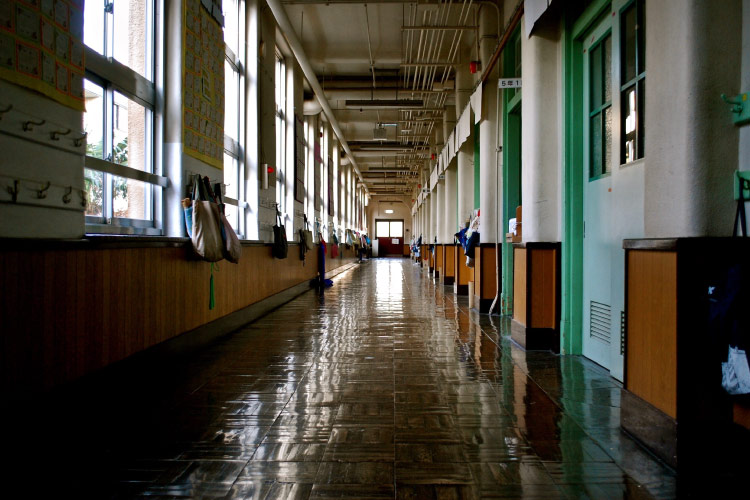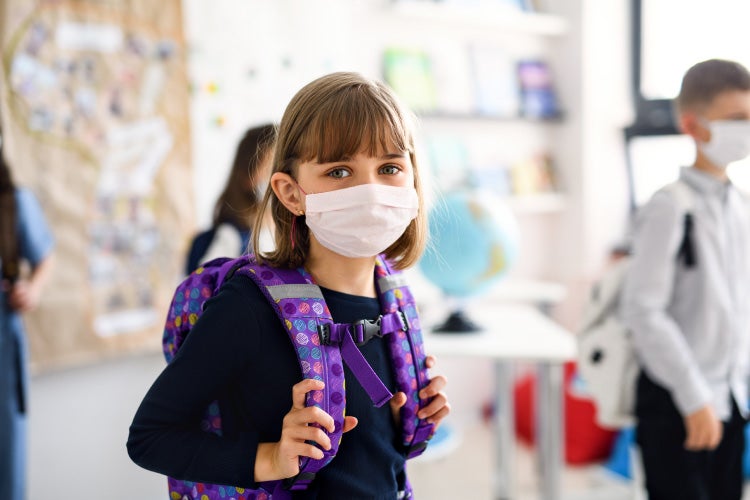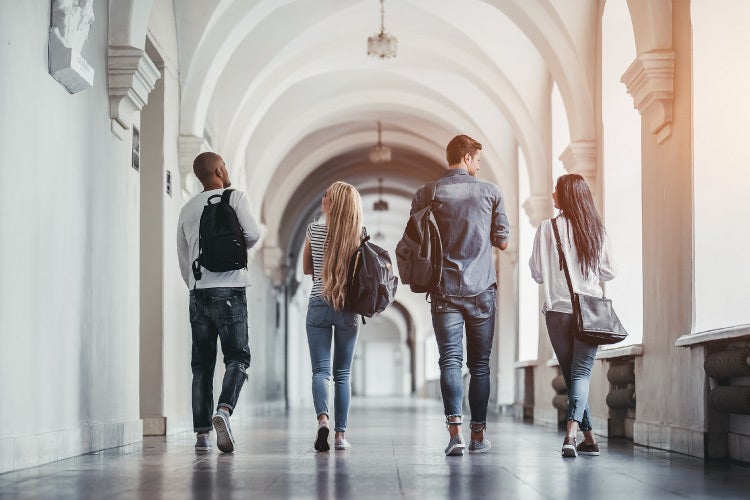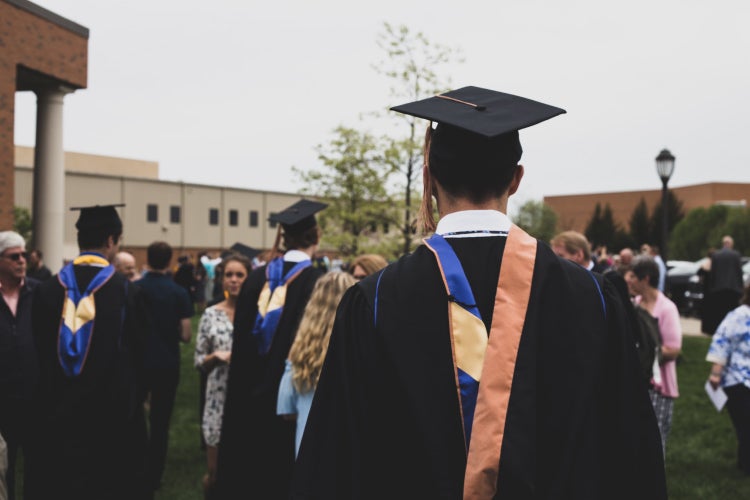
School Counselor: What Does the Future Hold?
A school counselor occupies an important role during the global pandemic. That role is to listen to students, help students transform their goals into actions and support/blog/school-counselor-what-does-future-hold students’ mental health during challenging times. As a result of COVID-19, some schools may opt to go in-person, go online and or use a hybrid version, all three of which present challenges to guidance counselors.
As a result of potential nationwide closures, classrooms have moved online. However, chronic absenteeism may become a prevalent concern during the state of the global pandemic that guidance counselors are stepping up to remedy.
According to a recent New York Times article, teachers at some schools across the United States reported that fewer than half of their students participated in online learning in the Spring.
School leaders look for solutions to help children catch up academically and socially and a school counselor plays a vital role in this solution.
A guidance counselor can help encourage students by staying connected online, by promoting their academic goals and by co-creating a better future for their students.
Learn more about how a guidance counselor can make a difference in students’ lives during COVID-19 and beyond.

The Role of a School Counselor During COVID-19
A school counselor acts as an advocate for students’ well-being and academic advancement. These professionals have the unique responsibility of paying attention to a student’s experience in school while also questioning how their experience outside of the classroom influences their education and mental health.
The global pandemic has undoubtedly affected the way students approach their education. Laura Ross, a middle school counselor in Lawrenceville, Georgia, was asked how school leaders can best support students when they return to school after the summer and she says, “making
sure that we're prepared to deal with some of those feelings that are going to increase — of anxiousness, of grief, of that disconnect that they had for so long.”
Responsibilities of a School Counselor
The following duties and responsibilities fall under the role of a school counselor:
- Counsels students about their academic, social and emotional lives
- Makes an effort to get to know the students they counsel
- Provides individualized student planning services to further a student’s academic goals
- Provides counseling to students about educational, social and important school policies and offers workshops and learning seminars
- Maintains communication with parents, teachers, administrators and external agents regarding a student’s academic success and overall well-being
- Provides feedback and takes action to create solutions that enhance an individual student’s academic needs
- Help identify students who may need intensive services and coordinates with behavioral health specialists
- Helps students and parents in understanding school policies
- Provides brief counseling to address a student’s social and emotional concerns but additionally refers students to behavioral health specialists when necessary
- Collaborates with behavioral health specialists on developing student support systems at school
- Maintains a presence at appropriate student activities and school events (or an online presence in the event of virtual schooling)

A Move Toward an MTSS Framework
Before a school counselor can prepare students for the future, they must first prepare themselves with the necessary resources and tools to provide value to their students during COVID-19 and thereafter.
School counselors have studied and developed an important framework for change called Multi-Tiered System of Supports. The MTSS was designed by school counselors to foster “comprehensive school counseling programs that promote students’ academic, career, social and emotional success as well as equitable student outcomes and systemic changes.”
What is MTSS?
The MTSS is, “a framework that many schools use to provide targeted support to struggling students. It focuses on the ‘whole child.’ MTSS supports academic growth and achievement, but it also supports many other areas. This includes behavior, social and emotional needs and absenteeism.”
This means that MTSS is a holistic approach to learning to support students through large-scale life changes like the presence of the global pandemic. A school counselor can use this framework to improve their students’ experience both inside and outside the classroom.
MTSS is expected to prevail in a post-pandemic world and support a better future for both a guidance counselor and their students.

How Does MTSS Work?
MTSS is a proactive approach that accomplishes its goal to assist and support students by using the following MTSS elements:
- Universal screening for all students
- Increasing individual support for those who are struggling
- Integrated plans that address students’ academic, behavioral, social and emotional needs
- The use of evidence-based strategies
- Access to school-wide student support (teachers, counselors, psychologists and other specialists work as a team)
- Professional development so staff can deliver interventions and monitor progress effectively
- Family involvement so parents can understand the interventions and provide support at home
- Frequent monitoring of students’ progress so educators can use this data to help decide if more interventions are needed

How a School Counselor Can Stay Connected to Students During COVID-19
COVID-19 has changed the ways a school counselor will interact with their students. One of the most important steps a school counselor must take to influence students throughout the global pandemic is finding ways to stay connected and engaged on a virtual platform. There are a multitude of ways a guidance counselor and other school leaders are encouraging connection with their students.
Providing Virtual Advisement
A guidance counselor can use technology and online tools to continue to provide course advisement to students in the following ways:
- Follow school guidelines when accessing student records online
- Be accessible to students online through email, phone and other online platforms
- Follow communication plans outlined by the school administration
- Comply with school and district regulations when communicating online
- Offer online resources to students and their families that can enhance their academic, career and emotional development

Providing Virtual Counseling
A guidance counselor can use technology and online tools to continue to provide virtual counseling to students in the following ways:
- Use the online platforms recommended by the school board
- Recognize the requirements around confidentiality in a virtual setting
- Establish boundaries with students and their families before engaging in virtual counseling
Online Counseling Resources During COVID-19:
- American School Counselor Association (ASCA) Toolkit: Virtual Middle School Counseling
- ASCA Toolkit: Virtual Elementary School Counseling
- ASCA Toolkit: Virtual High School Counseling
- ASCA Virtual School Counseling Lessons and Tools
- US Department of Education COVID-19 ("Coronavirus") Information and Resources for Schools and School Personnel
- Family Education Rights and Privacy Act and Coronavirus FAQs
- Moving your School Counseling Program Online
- Second Step Resources for Educators and Families
- Share my Lesson by Educators, For Educators - Coronavirus Student Guide
- Virtual School Counseling Resource Guide
Learn more about SBU's Online Master's in School Counseling

The Importance of Trauma-informed Care
What does the future look like for a guidance counselor after the coronavirus pandemic and nationwide shutdowns? According to Brian Coleman, a high school counselor in Chicago, the trauma that has resulted from school closures and other triggering events such as the nationwide protests against police brutality and endemic racism, means "trauma-informed care is going to really, really explode in ideally healthy, meaningful ways."
Individual Trauma and School Counseling
A guidance counselor is available to help every student excel. However, school counselors should be trained to address the unique needs of each student. Black students navigating the current landscape in the United States need support from educated school leaders, especially their school counselor.
Valerie Strauss wrote an impactful book titled “Teaching for Black Lives” that helps educators navigate how the school curriculum, teaching styles and policies in the education system affect black students.
Strauss commented on the importance of anti-racism in the classroom in her book when she says, “educators can and should make their classrooms and schools sites of resistance to white supremacy and anti-Blackness, as well as sites for knowing the hope and beauty in Blackness.”
A school counselor can use a trauma-informed practice to understand the impact that racism and other forms of injustice have on their students and be equipped with the necessary resources to listen and respond to their students.

Providing Trauma-informed Care
According to the American School Counselor Association, a school counselor has a unique role in the school system to provide trauma-informed care to students. A guidance counselor can create a trauma-sensitive environment for students by doing the following:
- Recognize the signs of trauma in students
- Understand that traumas do not predict individual failures
- Focus on the resilience and strength of students
- Do not re-traumatize students
- Create open communication and trauma-sensitive school communities
- Encourage the school to engage with positive social networks in the community
- Push for social and emotional learning at school
- Promote safe, stable and nurturing relationships with students
- Provide additional resources and information to students
- Educate staff members about the effects of trauma
- Ask staff to refer vulnerable students to a guidance counselor
- Refer students to behavioral health specialists when necessary

Digital Safety, Cyberbullying and Privacy Protection For Students
More kids are spending time online amid the global pandemic. It’s helpful for guidance counselors to provide a refresher on digital safety, cyberbullying and the importance of privacy protection.
According to Scholastic, “experts say banning technology is not the answer, but rather teaching kids to be good digital citizens.” A guidance counselor can educate students about how to navigate the internet safely rather than avoid it altogether.
Digital Safety
Students must be taught how to stay safe online. A school counselor can encourage digital safety through education and teach their students the following:
- Set standards for what is acceptable and unacceptable to do online
- Teach students not to share sensitive personal information online
- Discuss the impact of social media on mental health and well-being and create social media parameters
- Create a line of open communication and encourage kids to report problems they encounter online with a guidance counselor
- Ask parents to talk to their kids about their internet use

Cyberbullying
With physical classrooms being replaced by virtual classrooms, more students are interacting with one another online. Online interactions take place behind a screen and can, therefore, lead to less censorship and higher instances of cyberbullying.
A school counselor can push for the implementation of a cyberbullying intervention and prevention program to combat online bullying during the global pandemic.
Studies show that these programs can reduce cyberbullying perpetration by approximately 10%–15% and cyberbullying victimization by approximately 14%.
A school counselor can help prevent cyberbullying by taking the following actions:
- Take cyberbullying seriously
- Go online and get familiar with social networking sites, slang and terms students are regularly using
- Recognize social cues from students that may be experiencing bullying
- Encourage students to screenshot and report instances of cyberbullying
- Talk to the student responsible in instances of cyberbullying
- Invite parents to the conversation and share the instance and school policy

Privacy Protection
Educators that have moved their teachings online are now using new mediums such as video cameras and instant messaging platforms to communicate with students. A teacher, a guidance counselor and a student should be equally informed about the Health Insurance Portability and Accountability Act (HIPAA), and the Family Educational Rights and Privacy Act (FERPA) regulations around the use of digital platforms.
Guidance counselors with questions about HIPAA and FERPA details related to digital platforms for school counseling can find answers here.
How a School Counselor Can Help With the Remote College Application Process
One of the essential ways that a school counselor supports students is by assisting with course completion and the college application process.
According to Forbes, “Studies have shown that personalized and intensive college counseling creates more college opportunities for low-income students and those from high schools with fewer resources.”
COVID-19 has impacted many areas of the college application process including standardized test preparation and college visits.
A guidance counselor can help students prepare for college during COVID-19 by doing the following:
- Assist students in their process of researching colleges
- Discuss college plans and goals with students
- Provide support through the college application process
- Help students prepare and register for standardized tests
- Provide resources for online college fairs and virtual visits
- Communicate financial aid programs to students and parents

What Does the Future Hold for Students?
Will it be safe to reopen schools in the fall? If so, what will the reopening look like? As an educator, school leader or guidance counselor, it’s important to stay informed and prepare for the school year online and offline.
Although schools may begin reopening, public-health experts have said that even once schools do reopen, they should plan for possible closures in the event of further coronavirus outbreaks. As a result, school leaders must be prepared for all possibilities.
What Will High School Be Like in the Fall?
In April, the White House released a three-phase plan for a gradual reopening of businesses and institutions. A guidance counselor will be essential in communicating these plans to parents and students. The Washington Post summarized the key points of the White House’s three-phase plan:
“In the first phase, people are encouraged to continue practicing social distancing while vulnerable populations remain at home and employees are allowed to continue teleworking. If there’s no indication of a coronavirus rebound, a state can move to phase two, which allows schools to open, nonessential travel to resume and large venues to begin to ease physical distancing. Phase three lifts most remaining restrictions, although it still advises large venues to continue “limited” social distancing.”
If the cases of coronavirus begin to decline over the summer months, it’s possible that high schools will reopen with certain protective measures in place. According to the Cut by New York Magazine, these protective measures could include:
- Screening students for COVID-19 symptoms
- Spacing desks 6 feet apart
- Students eating lunch at their desks rather than the cafeteria
- Closing playground and communal spaces
- Requirements to wear masks
- Daily disinfecting of highly touched surfaces
- Limited class sizes
- Staggering school drop off and pick-up times
A guidance counselor will be essential in helping students integrate into this “new normal” and helping identify the anxieties students may experience. A guidance counselor can also use their training to inspire and uplift students to get excited about returning to school and furthering their education and future career.

What Will College Be Like in the Fall?
A guidance counselor helps students transition smoothly from high school to post-secondary school, however, the global pandemic has also created new realities for life on campus.
Colleges and universities across the country are questioning how campuses will reopen—and if campuses will reopen at all.
In a recent survey of more than 800 colleges and universities in The Chronicle of Higher Education, two-thirds said at the end of May that they were planning for an in-person semester in the fall.
Michael Goldstein, Senior Counsel in the Higher Education Practice at Cooley LLP, believes that the fall semester college experience will likely be a hybrid of in-person and online student interaction.
Goldstein says, “With universities now being challenged to innovate during a period of tremendous disruption, a hybrid-type delivery model, embracing both face-to-face and online instruction, may become not only the most adaptable method but also the most effective.”
A guidance counselor can communicate these expectations to students, especially seniors questioning the probability of their first year at a college campus.

What Does the Future Hold for School Counselors?
The global pandemic has revealed how important and vital a trained guidance counselor is for students. Brennan Barnard an education expert from Forbes says, “School counselors are on the frontline of supporting our nation’s young people as they move through their educational journey.”
A trained school counselor can help quell students' fears around uncertainty and inspire their students to continue to strive for a fulfilling academic and professional life in the future.
Barnard goes on to say, “The viability of our workforce and the economic outlook for the country depend on a well-educated society that has made wise choices after high school. The most reliable way to ensure this is to support our school counselors.”
The future of the children and the economy in the United States starts in homes and in classrooms. A guidance counselor is truly on the “frontline” when it comes to rebuilding the American economy and guiding America’s youth in a post-pandemic future.
In a post-pandemic future, a guidance counselor can expect the following changes:
- Increase in online counseling platforms and services
- Greater focus on mindfulness-based practices and meditation for mental health
- Individual counseling for students vulnerable to mental health issues
- Greater attention paid to online privacy and confidentiality
- Counselors seeking other behavioral specialists to aid students
- Comprehensive college advising online
- A holistic MTSS approach to school counseling

Become a School Counselor With an Online MSED
St. Bonaventure University’s online Master of Science in Education School Counseling will help you develop a career rooted in your compassion for students in need as a guidance counselor.
Learn essential skills such as the fundamentals of counseling, the development of a unique counseling style in P-12 environments and the ability to improve outcomes for students.
Students taking an MSED can gain a greater understanding of relevant topics like how to lead multicultural counseling and how to introduce counseling programs to schools. All the tools and skills acquired by MSED graduates can be applied in a real-world educational setting and enable informed school leadership.
For many, becoming a guidance counselor is more than just a career path. A guidance counselor can connect with students and make a long-lasting impact on the lives of their students’ well-being, educational experience and career.
Julie Taylor, a school counselor at an Elementary School in Oregon, Ohio conveys her experience when she says, “Making a difference in the lives of students is simply what school counselors do. It is a huge responsibility, true honor and the most rewarding experience of my life.”

St. Bonaventure University's Online MSED in School Counseling
St. Bonaventure University’s Online MSED in School Counseling touts a 95% licensure exam passage rate and graduates working from middle school to college.
An advanced degree in school counseling is the right foundation for prospective school counselors.
Make a difference in your career with an online MSED in School Counseling from St. Bonaventure University.
